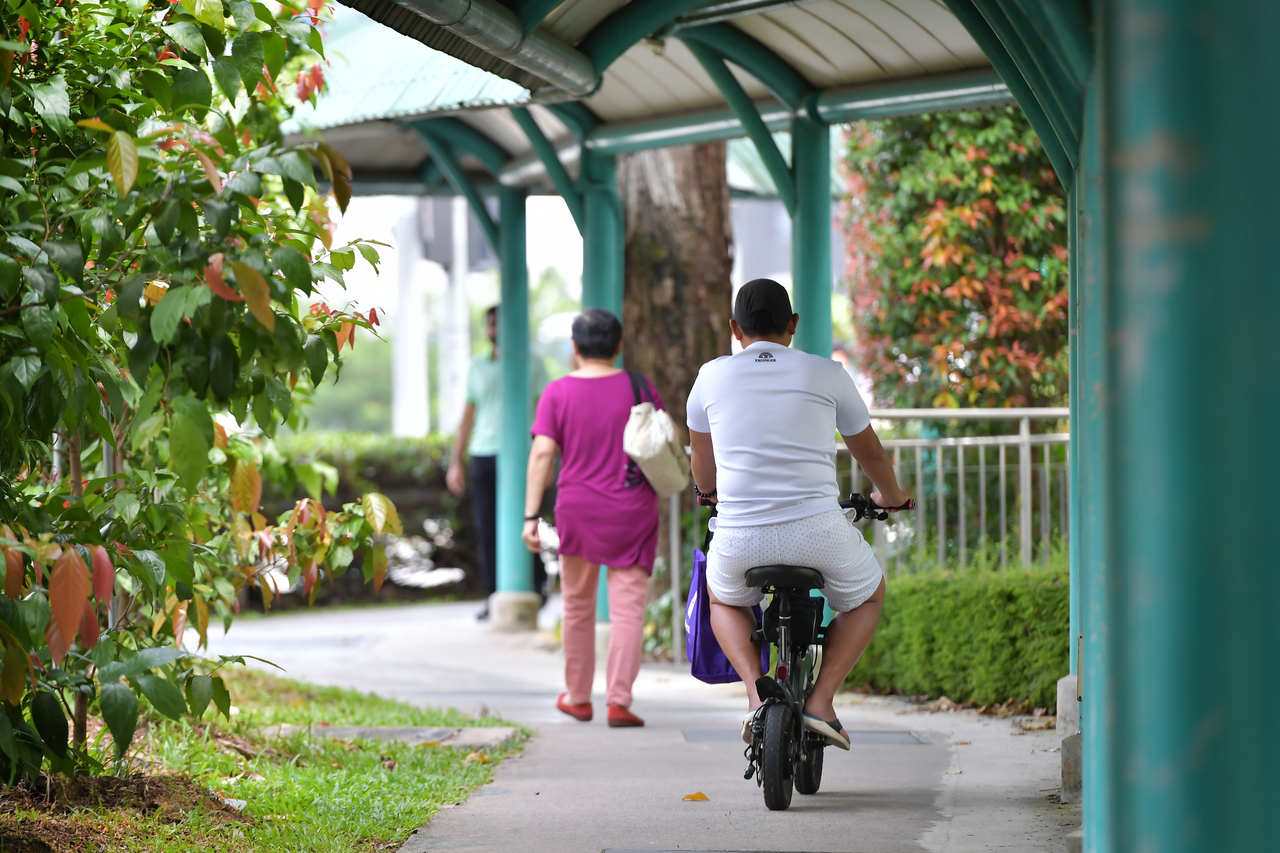Parliament: Law passed to raise penalties for active mobility offences; extend e-scooter footpath ban from April
Sign up now: Get ST's newsletters delivered to your inbox

Senior Minister of State for Transport Janil Puthucheary said that the new regulations will increase awareness of rules, tackle distracted riding among users, and ensure that only compliant devices are used on public paths.
PHOTO: ST FILE
SINGAPORE - Errant users of electric scooters, electric bicycles and other active mobility devices will face more severe punishment, with bigger fines and longer jail terms for several offences.
Apart from e-scooters, all other motorised personal mobility devices (PMDs) will also be banned from footpaths from April this year, under changes to the Active Mobility Act passed in Parliament on Tuesday (Feb 4).
In another change, those under age 16 will no longer be able to ride e-scooters on public paths without adult supervision.
In addition, e-scooter and e-bike users will have to pass an online theory test sometime in the first half of next year.
New users of the devices will also have to take the test.
Active mobility devices include bicycles and power-assisted bicycles; motorised and non-motorised PMDs such as kick-scooters, electric scooters and hoverboards; and personal mobility aids (PMAs) such as wheelchairs, motorised wheelchairs or mobility scooters for persons with walking difficulties.
The Shared Mobility Enterprises (Control and Licensing) Bill was also introduced and passed in Parliament on Tuesday.
Senior Minister of State for Transport Janil Puthucheary said both Bills will allow the Government to effectively regulate individual device users, retailers, businesses and device-sharing operators.
He told the House that footpath accidents involving PMDs have dropped by 52 per cent since e-scooters were banned from footpaths on Nov 5 last year.
But Singapore's regulatory framework must continue to adapt with the evolving active mobility landscape, he added.
Dr Janil said the proposed changes will increase awareness of rules, tackle distracted riding among users and ensure that only compliant devices are used on public paths.
He noted that there were about 4,900 offences involving active mobility devices last year, a number that is "not acceptable".
"To send a stronger deterrent message to this group, we will increase the maximum penalties for certain offences."
For instance, the maximum penalty for a first-time offender caught speeding on public paths will be doubled. Fines will be raised to $2,000 and the jail term to six months.
Similarly, reckless riders of active mobility devices on public paths could face a doubling in their maximum fine to $10,000 and/or jail term to 12 months.
Under the Active Mobility (Amendment) Bill, e-scooter users will be required to send their devices for re-inspection every two years to deter cases of illegal modification.
Dr Janil said there were 28 cases of retailers getting caught for various offences last year, including displaying and advertising non-compliant devices.
The regulatory regime will clamp down on errant retailers in three ways.
First, the Land Transport Authority will get the power to enforce against all forms of modifications on active mobility devices. This closes a loophole where retailers have been carrying out modifications but claim that they are doing it for their own device or helping a friend to do it for free.
Second, retailers will have to send e-scooters for inspection to ensure compliance with device criteria.
Lastly, errant retailers who sell non-compliant devices will face significantly tougher penalties.
For example, a first-time offender who is an individual who sells a non-compliant device for use on public paths will face a fine of up to $20,000 and/or 24 months' jail - up from $5,000 and/or three months' jail.
Dr Janil also told the House that certain businesses that use active mobility devices on paths, such as food delivery companies, will be required to ensure that their riders are covered by third-party liability insurance to provide victims in any accidents a greater recourse for compensation.
"We are working with the Active Mobility Advisory Panel and the insurance industry to study how best to extend such insurance requirements to individual active mobility device riders," he added.
All these changes are part of the Active Mobility (Amendment) Bill.
The Shared Mobility Enterprises (Control and Licensing) Bill will expand the scope of the current device-licensing scheme beyond controlling indiscriminate parking to focusing on public safety, said Dr Janil.
It also allows the authorities to regulate all active mobility device-sharing services, including those offering sharing services on private land.
Previously, operators like Grab could not deploy their e-scooters on public land such as parks without a licence. But they could still operate by making arrangements with small property owners to park and rent out the devices. Such devices eventually ended up on public paths when users borrowed them.
In addition, the Bill introduces a class licence regime that will let operators whose businesses pose less safety or parking concerns operate under fewer rules.
Dr Janil said: "Different business models are likely to be developed in the future. Thus, it is necessary to update our regulatory regime."


